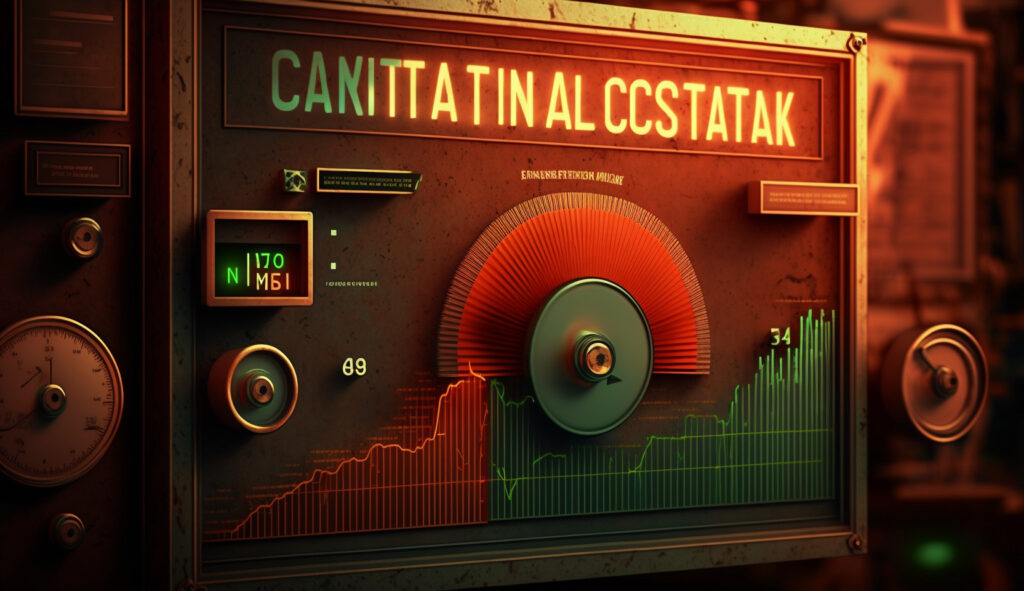
- Eugene Steiner
- Updated: April 20, 2025
If you’re reading this article, you’re likely a student studying macroeconomics or a trader/investor seeking that extra edge in understanding the markets. Either way, welcome—you’re in the right place. We’re a foreign exchange market-oriented platform, and this article will dive deep into the Efficient Market Hypothesis (EMH) forms and what they mean for all market participants. Don’t worry; the insights here are transferable across different asset classes. So, let’s get started with a closer look at weak, semi-strong and strong form of EHM and what they mean for the landscape of financial markets.
What Is an Efficient Market?
An efficient market is a hypothetical place where asset prices always reflect all available information about an asset. Think of it like this: the price you see on the screen of your trading platform is the “fair” price at this particular point in time because it factors in all the news, even rumors, all available information, everything!
This means it’s super hard to “beat” the market and consistently make money. If some good or bad news comes out, the price jumps up or down immediately. You can’t really profit because everyone else knows it, too. Nobody has an “edge,” no matter what method they use or how long they stare at the screen of their trading platform.
Now, this doesn’t mean the price is always right. But it’s the best guess based on what we know now. And because tons of people are trading, prices adjust really quickly. It’s like a constant tug-of-war among different market participants that helps to keep the price in check.
Of course, no market is perfectly efficient. There are always some inefficiencies, and that’s where savvy investors try to find opportunities. But the general idea is that prices are pretty darn good at reflecting reality.
What Is the Efficient Market Hypothesis (EMH)?
The economist Eugene Fama developed the Efficient Market Hypothesis (EMH)1 and first introduced it in depth in his 1970 research paper. Fama argued that it’s nearly impossible to consistently “beat the market” over the long term. This means that you can’t achieve returns above the average market returns, like those of major stock indexes (e.g., the S&P 500), on a regular basis.
Sure, you might occasionally get lucky with a big win, but Fama’s point was that, on average, investors can’t consistently outperform the market. The reason? He proposed that markets are so efficient that all relevant information about stocks is already reflected in their prices. So, any attempt to “outsmart” the market is unlikely to yield consistently higher returns than simply tracking the market itself.
Now, here’s where it gets interesting. If investors could consistently make extra money—what economists call “abnormal returns”—by trading on certain types of information, it would imply that the market is not fully efficient. Abnormal returns are like the “extra” earnings over what you’d expect from a market average. So, if you aimed to make $10 and ended up with $15, that extra $5 would be an abnormal return. In essence, Fama’s Efficient Market Hypothesis explores how much information is factored into prices and how that affects potential earnings. It’s a fascinating way to understand how markets might work, don’t you think?
What Do We Mean by “Market” in the Context of EMH?
Eugene Fama’s research and the Efficient Market Hypothesis (EMH) primarily focused on the U.S. stock market. He largely drew his conclusions from studying stock prices and behavior in a developed market—specifically, one with an advanced legal framework, strong public institutions, and regulatory systems designed to create a level playing field.
In a developed country like the U.S., financial markets operate with high levels of transparency, comprehensive reporting requirements, and active regulatory oversight. These conditions are crucial for the EMH, as they help ensure that information is broadly available to all market participants and incorporated into prices quickly, reducing the likelihood of consistent market inefficiencies.
Therefore, Fama’s conclusions apply most to developed markets where:
-
- Substantial regulations exist governing disclosures, trading practices, and investor protections.
-
- Public companies must disclose accurate and timely information, making it available to all participants.
-
- High liquidity ensures that prices adjust swiftly in response to new information.
-
- A strong legal system enforces contracts, protects property rights, and deters fraud, making the market fairer and more efficient.
In contrast, markets in developing countries or emerging markets may exhibit a different level of efficiency. They often face issues like limited transparency, weaker regulation, lower liquidity, and less consistent access to reliable information. In these contexts, Fama’s EMH may not hold as strongly, and investors may find greater opportunities for outsized returns due to inefficiencies.
So, yeah, Fama’s conclusions about market efficiency were based on and are most relevant to developed markets like the U.S. stock market, where structural and regulatory conditions support more efficient information pricing.
What Forms of the Efficient Market Hypothesis Exist?
Fama defined three forms of the efficient market hypothesis:
-
- Efficient Market Hypothesis weak form,
-
- Efficient Market Hypothesis semi-strong form,
-
- And Efficient Market Hypothesis strong form.
Each is based on the amount of information already incorporated into prices. More on that below.
Efficient Market Hypothesis Weak Form
The Efficient Market Hypothesis weak form is an exciting concept! It suggests that asset prices already incorporate all past market data, such as historical prices and trading volumes. This is the most basic form of the Efficient Market Hypothesis.
In an Efficient Market Hypothesis weak form environment, predicting future price movements by analyzing charts and past price patterns won’t give you an advantage. The current prices already reflect this information.
Some traders attempt to use technical analysis to test this hypothesis. They look at charts to identify patterns. They apply tools like indicators to predict future price behavior based on past trends. But does this approach work? We tried to answer this question in one of our articles on technical analysis.
Some traders claim they can find sophisticated patterns that standard tests might miss. However, most evidence suggests that it’s challenging to beat the market consistently using technical analysis in developed markets like the U.S. or Europe. These markets are typically more informationally efficient, meaning available information is quickly reflected in stock prices.
Interestingly, some studies (12,23) indicate there may be more opportunities to profit using technical analysis in developing markets, where information may not circulate freely and inefficiencies are more common. It’s a hotly debated topic, and no definitive answer has emerged, but it’s certainly intriguing.
What Kind of Inefficiencies Do We Have In Mind?
In financial markets, inefficiencies occur when asset prices fail to reflect all available information, creating opportunities for above-average returns. In developing markets, common inefficiencies include information asymmetry, where not all participants have equal access to data and low liquidity, where prices don’t adjust quickly to new information. Behavioral biases and regulatory gaps also contribute, such as overreactions to rumors or insider trading in markets with weak oversight. Additionally, the lack of analyst coverage offers potential gains for savvy investors. Due to more robust regulations, transparency, and higher liquidity, these inefficiencies are less prevalent in developed markets.
What Is Semi-Strong Form Efficiency?
The semi-strong form efficiency of the Efficient Market Hypothesis (EMH) states that asset prices fully reflect all publicly available information. What this means is that even if you thoroughly analyze all available data, you won’t be able to gain an advantage. The reason for that is that the current price already incorporates such information. As a result, the market price is the most accurate estimate of the asset’s value. Additionally, semi-strong form efficiency builds on the weak form, which asserts that past price data has no predictive value for future prices, though the two forms can hold independently.
REMINDER: The Week Form is limited to historical price and volume data. The Semi-Strong Form includes all publicly available information in addition to historical data.
The semi-strong form efficiency of the Efficient Market Hypothesis (EMH) in the foreign exchange market context functions similarly to how it does for stocks. Under this theory, exchange rates fully reflect all publicly available information. Like what? Well, things like economic indicators, central bank policies, geopolitical developments, and trade data. Consequently, forex traders who analyze GDP reports, inflation statistics, or interest rate decisions cannot consistently outperform the market. The market has already incorporated this information into currency prices.
However, whether semi-strong form efficiency holds in the forex market remains debatable. On the one hand, currencies of developed markets, like major currency pairs (e.g., EUR/USD or USD/JPY), are often viewed as highly efficient. On the other hand, inefficiencies may still occur in emerging markets or during periods of low liquidity, potentially creating opportunities for traders.
What Is the Efficient Market Hypothesis Strong Form?
And last, but not least, let’s talk about the Efficient Market Hypothesis strong form. It is the boldest and most intriguing version of EMH. It claims that prices reflect all information, public, private and even insider secrets. In theory, this means not even someone with illegal insider info could consistently outperform the market. Sounds wild, right?
The catch is that while the strong form implies the weaker forms of EMH (weak and semi-strong), the reverse isn’t true. Both weaker forms could hold, but the strong form could still be false. The strong form is also tough to prove because, let’s face it, those using insider info aren’t exactly lining up to share their results. Sure, if we checked retail trading communities on Reddit or other social platforms, the consensus might be that large institutional investors engage in all kinds of “sorcery.” But we’re not here to speculate. As proponents of the scientific method, we stick to the facts. We don’t see steady consistency among any institutional investors.
When the Bank of Japan suddenly stepped in to influence the JPY value against the USD, no one saw it coming. This unexpected intervention caused a sharp price swing, something the Efficient Market Hypothesis (EMH) wouldn’t have accounted for. In situations like this, the strong form of EMH doesn’t seem to hold up well.
While developed forex markets are highly efficient, they aren’t perfectly efficient after all. Besides, the EMH’s strong form is unlikely to hold universally. Why? Temporary inefficiencies can and do arise every now and then. For instance, central banks engage in interventions and take everyone by surprise, or unexpected geopolitical shocks emerge here and there across the globe.
In short, the strong form’s application to the forex market would imply a near-perfect efficiency level. It would leave no room for traders to exploit private or inside information. However, real-world evidence suggests this efficiency level is rare, which makes the strong form more of a theoretical construct than a practical reality in foreign exchange or any other financial market.
Conclusions: A Grain of Salt
The EMH is not a perfect concept; it is a hypothesis and has its skeptics. How so? It makes one wonder whether it is true when market anomalies occur. One such anomaly is the January Effect, where stocks often perform better in January. The other one is the momentum effect, where trends continue in the same direction, which contradicts it. While many investors have consistently tried and failed to outperform the market, some have succeeded. For instance, in the forex market, the “forward premium anomaly” challenges the EMH by showing that currencies with higher interest rates tend to appreciate rather than depreciate, as the theory would suggest. So, while EMH is a valuable guide, it’s not an unbreakable rule.
Inefficiencies may exist in less mature markets, which may allow traders to achieve abnormal profits. For example, in some emerging forex markets, information asymmetry and lower liquidity can lead to mispricings that savvy traders might exploit. Different rules for different financial playgrounds—who would’ve thought? This brings us to the final thought.
Practical Considerations
How does that all fit in the context of the Foreign Exchange Market? The forex market doesn’t fit neatly into an “efficient”, “inefficient” or even “semi-efficient “labels across the board. Instead, it exhibits varying degrees of efficiency depending on the currency pair. In other words, forex market efficiency exists on a spectrum, with different currency pairs occupying different efficiency positions.
Major currency pairs, like USD/EUR, tend to be more efficient. They are more liquid; these currencies have more transactions and extensive information availability. In contrast, minor or exotic pairs with lower trading volumes may display inefficiencies because they are less liquid and more susceptible to irregular price movements or information asymmetry.
This perspective aligns with the concept of “market microstructure,” where different segments within a broader market can function at different efficiency levels based on factors like trading volume, participants, and access to information. So, instead of viewing the forex market as a single efficient or inefficient entity, it’s more accurate to consider its efficiency on a spectrum that varies by currency pair.
So, next time someone talks about “beating the market,” you’ll have the inside scoop on what they mean. You can find your own pathways and better navigate the ever-challenging and ever-changing financial seas. Stay ahead with our in-depth experience, analysis and forecasts by subscribing to our newsletter.
EMH Comparison Table: What Each Form Assumes About Market Efficiency
| EMH Form | What’s Priced In? | Can You Beat the Market? | Implication |
|---|---|---|---|
| Weak Form | All past prices and volume data | Not with technical analysis | Charts won’t give you an edge |
| Semi-Strong Form | All publicly available information | Not with technical or fundamental analysis | News and reports are already priced in |
| Strong Form | All information—public and private | Not even with insider info | No one can consistently outperform |
REFERENCES:
1. Efficient Capital Markets: A Review of Theory and Empirical Work Eugene F. Fama
2. Technical analysis in the foreign exchange market by Christopher J. Neely and Paul A. Weller
3. Examination of the profitability of technical analysis based on moving average strategies in BRICS by Matheus José Silva de Souza, Danilo Guimarães Franco Ramos, Marina Garcia Pena, Vinicius Amorim Sobreiro & Herbert Kimura



